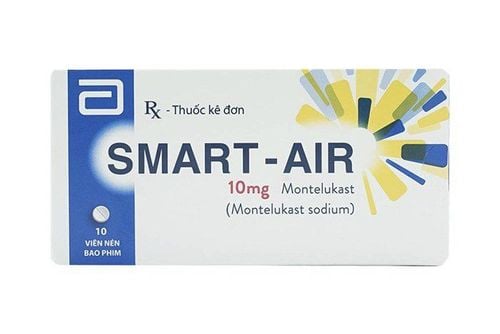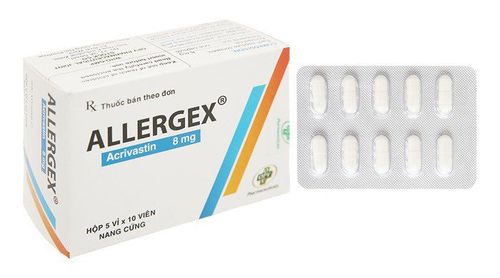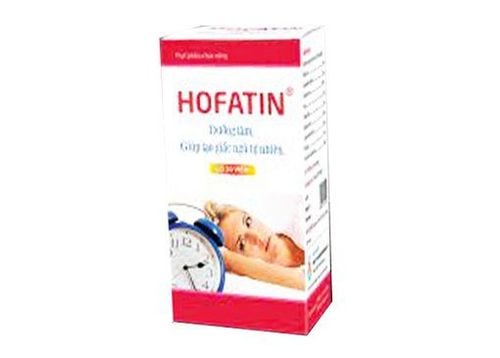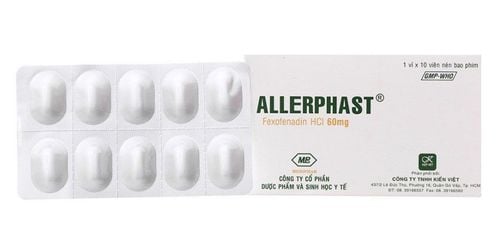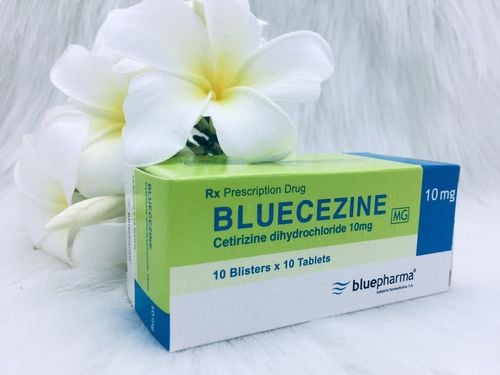This is an automatically translated article.
Lerphat is an antiallergic drug used in cases of hypersensitivity. The drug has the main ingredient is Fexofenadin, 50mg content, prepared in the form of tablets. Let's find out what Lerphat drug works through the article below.1. Indications and uses of Lerphat
1.1. Point
Seasonal allergic rhinitis. Chronic urticaria. Symptoms: Sneezing, runny nose, itchy throat, palate, red itchy eyes, watery eyes.1.2. Uses
Active ingredient Fexofenadine is a new generation antiallergic drug - H1 receptor antagonist, long acting for the treatment of allergies and without sedative effect.The metabolite of fexofenadine is terfenadine, an antihistamine with selective peripheral H1-receptor antagonist activity.
Lerphat inhibited antigen-induced bronchoconstriction in susceptible guinea pigs and inhibited histamine secretion from peritoneal mast cells in rats.
Furthermore, Lerphat has not been found to have sedative or other central nervous system effects.
2. Dosage - How to take Lerphat
Seasonal allergic rhinitis: Adults and children over 12 years old: Take 02 tablets of 60mg x 2 times/day or 180mg x 1 time/day. Children from 6 to 11 years old: Oral dose of 30mg x 2 times/day. In patients with renal impairment, the initial dose is 60 mg once daily, dose adjusted depending on creatinine clearance. Children with renal failure starting dose 30mg x 1 time / day. Chronic urticaria: Adults and children over 12 years: Oral dose of 60mg x 2 times/day. Children from 6-11 years old: Oral dose of 30mg x 2 times/day. In patients with renal impairment, the starting dose is 60 mg once daily. Children with renal failure starting dose 30mg x 1 time / day. Dosage of Lerphat is for reference only, please contact your doctor/pharmacist to get the right dose for your medical condition.How to use: Lerphat is taken orally.
3. Contraindications to the use of lerphat
Patients with hypersensitivity or irritation to the ingredients of Lerphat .4. Interaction of lerphat with other drugs
The drug does not interact with drugs metabolized by the liver because the active substance Fexofenadine in Lerphat is not metabolized in the liver. The drug erythromycin or ketoconazole, when combined with lerphat, increases the plasma concentration of Fexofenadine by 2-3 times. Antacids containing aluminum or magnesium gels when used concomitantly with fexofenadine reduce the bioavailability of lerphat. In order to avoid drug interactions, patients need to truthfully declare to their doctor all relevant medical history, prescription or non-prescription drugs being used so that the doctor can consider appropriate indications.5. Side effects when taking Lerphat
Common side effects when taking lerphat:Headache. Dizziness, dizziness. Tired. Inform your doctor about the unwanted effects that you experience when taking lerphat for timely response and remedy.
6. Notes when using lerphat
Be careful when using lerphat for the elderly, patients with kidney failure, liver failure. The use of lerphat is not recommended for pregnant and lactating women. Lerphat should only be used in this population when absolutely necessary, the benefits outweigh the risks.7. Overdose, forgetting dose of Lerphat and handling
Overdose of Lerphat: If it is an emergency, call 911 immediately or go to the nearest medical facility/local health station for timely monitoring and treatment. Missed dose of Lerphat: If you miss a dose, take it as soon as possible. However, if the missed dose of Lerphat is close to your next dose, skip it and take your next dose at the scheduled time and do not double the prescribed dose. Lerphat is an antihistamine H1, used to treat seasonal allergic rhinitis, urticaria, .... The drug should be used as directed by a doctor/pharmacist. If you have any questions regarding Lerphat, please contact your doctor immediately for answers.Please dial HOTLINE for more information or register for an appointment HERE. Download MyVinmec app to make appointments faster and to manage your bookings easily.




